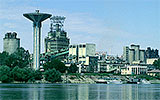Industry
The chemical, food, and pulp and paper industries are amongst the main industrial polluters in the Danube River Basin. Discharges from such plants significantly raise the levels of heavy metals and organic micropollutants in the river network. The degree of industrial development and pollution caused by the industrial sector varies among the countries.
The immediate environmental impacts of the inadequate treatment and storage of industrial and mining waste include water pollution, groundwater and soil contamination, and the reduced availability of clean water.
Other longer-term impacts can include the depletion of natural resources, landscape degradation, reductions in biodiversity, and health risks.
The problems associated by industrial activities and mining are caused by:
- The use of outdated technologies and harmful substances that could be substituted
- Discharges of wastewater into the sewerage systems without pre-treatment
- Inadequate treatment facilities
Industry and mining
Industry - including energy generation - and mining are economically important since they account for 31 - 42% of the GDP (gross domestic product) of the countries in the Danube River Basin, and 29 - 50% of total employment. The sector uses 5.7 billion m³ of water from the Danube River System every year. In many regions industries and mining operations are currently undergoing major structural changes due to political and economic developments.
What needs to be done
- New industrial wastewater collection and treatment facilities must be constructed, and existing facilities modernized and upgraded.
- Industrial wastewater facilities must be more effectively operated.
- Discharges of industrial wastewater into municipal sewer systems must be pre-treated, especially with regard to hazardous substances.
- Environmentally sound techniques should be universally applied.
- Hazardous substances should be properly stored, treated and disposed of.
- Water pollution from landfills must be prevented.
- Discharge permits must be revised with regard to BAT/BEP.
- Environment Management Systems (EMS, ISO 14001) must be more widely adopted.
Pollution from industry and mining can be significantly reduced through suitable investment in pollution reduction facilities. The ICPDR estimated that the necessary investments amount to some €200 million. The countries where substancial investment is needed are Romania, Hungary, Bosnia and Herzegovina, and Slovakia.
Independently of these investments, each country should:
- Introduce and enforce an appropriate legal and institutional framework;
- Ensure adequate management and
- Close any environmentally unacceptable sites or facilities, and construct new environmentally friendly landfills.
Recommendations on the application of Best Available Techniques (BAT) in priority sectors
The ICPDR has adopted the following recommendations and guidelines:
- Recommendation concerning the treatment of municipal waste waters, including reporting format
- Guidelines for the monitoring of waste water discharges
- Recommendation on best available techniques in the chemical industry
- Recommendation on best available techniques in the food industry
- Recommendation on best available techniques in the chemical pulping industry
- Recommendation on best available techniques in the paper making industry
In 2001, these BAT Recommendations were published in all the administrative languages of the Danube River Basin, for the benefit of both the regulators (the local water authorities), and the regulated entities (municipalities and industries).
As of 2004, the Danube countries are regulary reporting on the implementation of the BAT Resommendations. Beside the measures described in the draft Danube River Basin Management Plan, these Recommendations are the key measures for the reduction of industrial pollution in non-EU Member countries.
Disclaimer
The information contained in the ICPDR website is intended to enhance public access to information about the ICPDR and the Danube River. The information is correct to the best of the knowledge of the ICPDR Secretariat. If errors are brought to our attention we will try to correct them.
The ICPDR, expert group members, nor other parties involved in preparation of information contained on this website cannot, however, be held responsible for the correctness and validity of the data and information provided, nor accept responsibility or liability for damages or losses arising directly or indirectly from the use of the information conveyed therein.
Only those documents clearly marked ICPDR documents reflect the position of the ICPDR.
Any links to other websites are provided for your convenience only. The ICPDR does not accept any responsibility for the accuracy, availability, or appropriateness to the user's purposes, of any information or services on any other website.
When using the information and material provided on this website, credit should be given to the ICPDR.

